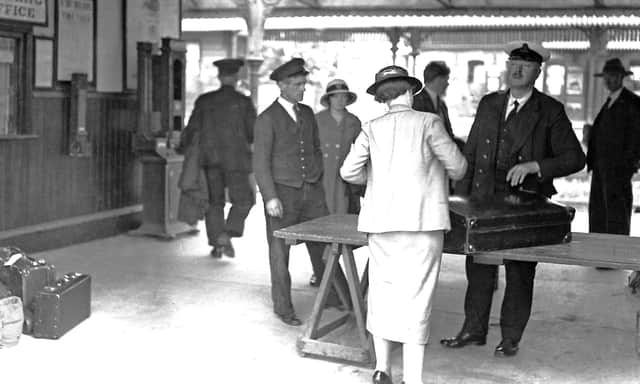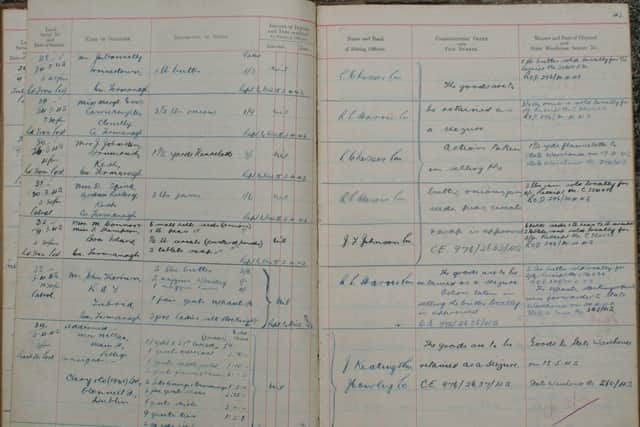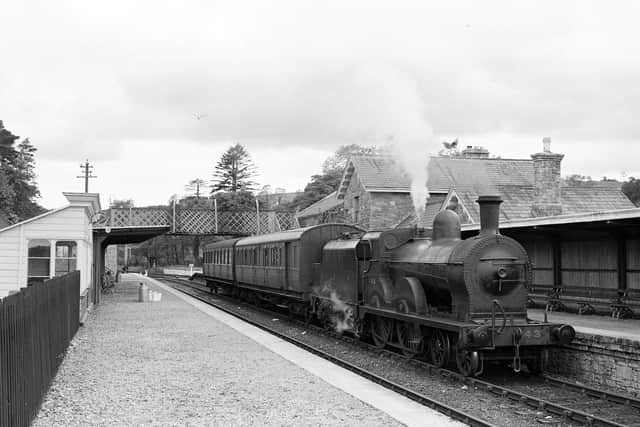Old customs book listed all kinds of everything seized on the border


While that would most likely bring some unpredicted changes to the protocol, things won’t ever be like what was recounted on this page recently, from an old Irish Customs Seizure Register.
Packed full of handwritten details by Irish customs officials and the Gardaí about goods confiscated on the Pettigo border between 1937 and 1945, the Register has recorded in meticulous detail the size, weight, quantity and value of farm animals, perishable and non-perishable goods and other immensely varied items seized on border patrols, in Pettigo Railway Station and in the Post Office.
Advertisement
Hide AdAdvertisement
Hide AdEverything in the old book was signed, countersigned, dated, checked, coded, referenced, double-checked and sub-referenced, with additional information included about court cases, fines and the ultimate sale or disposal (or ‘appropriation’!) of smuggled goods.


There are more than a few curious, colourful and bizarre entries in the old register.
An RAF Gunner from Castle Archdale was stopped and ‘three contraceptives’ were confiscated.
Another RAF-man from St Angelo airport was intercepted with ’3lbs of chocolate and a pair of stockings’.
Advertisement
Hide AdAdvertisement
Hide AdA Fermanagh-woman was caught with eight dozen rolls of wall paper; a Pettigo-man was relieved of two dead rabbits and two live hens and whatever the list was intended for we’ll never know but someone was caught with ‘a dozen knickers, a horse and cart, a pint of jelly, a piano accordion and a rifle.’


There are a lot of obscure details, abbreviations and legal references throughout the register but a News Letter reader who’s very knowledgeable about such matters and comes from a border community has kindly agreed to peruse the register and explain some of its complexities.
Meanwhile, some more entries.
On June 20, 1937 three seizures were recorded of eight, 10 and 16 gallons of ‘skim milk’, taken from three Pettigo farmers, from their horse and cart, though one of the entries called the horse a donkey!
The three farmers were stopped on the border by a patrolling Garda officer and a Customs Official at 10.15 am.
Advertisement
Hide AdAdvertisement
Hide AdEach case was given a lengthy reference number - C&E305.B6YY594/5/6 - and a deposit of £1 from each farmer was ‘remitted to the Station Officer’.
The Irish Excise Commissioners approved ‘destroying the goods’ on 31 July 1937 and ‘the deposit of £1 is to be brought to account as a compromise fine.’
This must have been retrospective approval because a previous note had been made in the register on June 26, 1937 stating ‘sample taken, retained at station. Skim milk destroyed by dumping in local river at Pettigo’.
The case was countersigned in red ink on 30 June 1937 and countersigned yet again on 28 July 1937.
Advertisement
Hide AdAdvertisement
Hide AdOn June 25, 1937 a two-man night patrol stopped Elizabeth (15 years) and Alice (10 years) at 11.30 pm and seized a long list of goods with an estimated value from several old pennies to a dozen old shillings.
The meticulously detailed list included: ‘one gent’s cap, two gent’s ties, four pairs of gent’s socks, one girl’s beret, three lady’s belts, one pair of black socks, one pair of gloves, three lady’s collars, one boys pullover, seven leather purses, one leather shopping bag, one lavatory brush, one pot cleaner brush, one hammer handle, two note books, one bar of soap, six cotton dusters, two glass cloths, six ice cream glasses, one gramophone sound box (whatever that was it was valued at three shillings!), one pair of leather sandals, one pair of lady’s leather shoes, one pair of girl’s rubber shoes, one fibre suitcase (valued at 10/6), one toilet paper hanger, one pair of pliers, one corkscrew, three bundles of pipe cleaners, one child’s storey (sic) book and intriguingly, six pieces of music valued at four shillings.’
Monetary deposits were taken by the patrol - a different sum for each of the named goods - from as little as a penny for the beret to 3/6 for the suitcase.
Having given them a long reference code - C&E653/3354/37 - the Excise Commissioners ordered that ‘the goods are to be retained as a seizure. The soap is to be destroyed locally.’
Advertisement
Hide AdAdvertisement
Hide AdAnother column in the Register noted ‘the suitcase and contents were checked and found correct in the presence of (illegible name and the abbreviation ‘JPM’.) Two gramophone sound boxes were amongst the contents, only one shown on list.
The bar of soap was destroyed in the river in the presence of (illegible name).’
A foot note was added on August 7, 1937 ‘forwarded to State Warehouse, Galway’ where the goods were held, prior to being sold on behalf of the government.
Gramophones and their ilk were evidently of some significance!
Advertisement
Hide AdAdvertisement
Hide AdA Pettigo resident was stopped and searched by no less than seven Garda and Customs officers in November 1937 and several hundred pounds of flour and 13 gramophone records. were seized.
The Commissioners ‘elected to proceed for £100.’
The case went three times to Pettigo District Court, the gramophone records were held by Customs and Excise before being ‘returned’ and the ‘flour was destroyed by dumping in the local river at 10pm on 25 March 1939’.
There’ll be more here from the Register after perusal by an expert.
A message from the Editor:
Thank you for reading this story on our website. While I have your attention, I also have an important request to make of you.
Advertisement
Hide AdAdvertisement
Hide AdIn order for us to continue to provide high quality and trusted local news on this free-to-read site, I am asking you to also please purchase a copy of our newspaper whenever you are able to do so.
Our journalists are highly trained and our content is independently regulated by IPSO to some of the most rigorous standards in the world. But being your eyes and ears comes at a price. So we need your support more than ever to buy our newspapers during this crisis.
With the coronavirus lockdown having a major impact on many of our local valued advertisers - and consequently the advertising that we receive - we are more reliant than ever on you helping us to provide you with news and information by buying a copy of our newspaper when you can safely.
You can also enjoy unlimited access to the best news from across Northern Ireland and the UK by subscribing to newsletter.co.uk
Advertisement
Hide AdAdvertisement
Hide AdWith a digital subscription, you can read more than five articles, see fewer ads, enjoy faster load times, and get access to exclusive newsletters and content. Visit https://www.newsletter.co.uk/subscriptions now to sign up.
Thank you